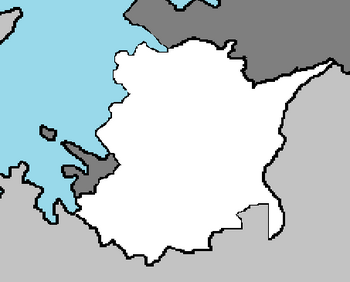Cyruda: Difference between revisions
(Created page with "{{Infobox country |native_name = |conventional_long_name = Republic of Cyruda |common_name = Cyruda |image_flag = Cyruda...") |
No edit summary |
||
| Line 1: | Line 1: | ||
{{Infobox country | {{Infobox country | ||
|native_name = | |native_name = | ||
|conventional_long_name = | |conventional_long_name = The Joint Republics of Cyruda | ||
|common_name = Cyruda | |common_name = Cyruda | ||
|image_flag = CyrudaFlag.png | |image_flag = CyrudaFlag.png | ||
| Line 90: | Line 90: | ||
}} | }} | ||
The '''Republic of Cyruda''', most commonly known as '''Cyruda''', is a nation located on the continent of [[Adula]], bordered by [[Alecburgh]]. Cyruda is a member of multiple international organizations, including the [[Southeastern International Association of Adula]] and the [[Coalition of Crown Albatross]]. | The '''Republic of Cyruda''', most commonly known as '''Cyruda''', is a nation located on the continent of [[Adula]], bordered by [[Alecburgh]]. Located in the South Adula subcontinent and along the coast of the [[Croix Sea]], it is largely closed off to the rest of [[Iearth|the world]]. Cyruda has been settled since at least the Upper Paleolithic but permanent human settlement traces back to the Neolithic age, during which time it was inhabited by a vast variety of cultures. After the arrival of the first Continental Adulans, it was populated by several [[Qolaysia]]n, [[Emmiria]]n, and [[Nebetia]]n civilizations. Culturally, politically, and socially, the country has a rich but complex history, having been first settled by the Nebetian and [[Ireqa]] peoples that populate the area today from the 6th through to the 9th centuries. In the 12th century the Cinate of Cyruda was established, which evolved into the Kingdom of Cyruda in the 14th century, after which it was annexed into the [[Bazira]] Empire, under whose rule it remained from the mid-15th to the late 18th centuries. The Bazira, along with their trading networks through Qolaysia and Emmiria, brought Islam to the region, and altered much of the cultural and social outlook of the country. After the [[World War (Iearth)|World War]], it was granted full republic status in the newly formed Socialist Federal Republic of Cyruda. Following the dissolution of the Socialist government, the republic proclaimed independence in 1992. | ||
Cyruda has a bicameral legislature and [[President of Cyruda|President]], whom is currently [[Guiler Batemara]]. However, the central government's power is highly limited, as the country is largely decentralized and comprises two autonomous entities: the Federal Republic of Cyruda and Republic Cyuc. | |||
Bosnia and Herzegovina is a developing country and ranks moderately in human development. Its economy is dominated by the industry and agriculture sectors, followed by the tourism and service sectors, the former of which has seen a significant rise in recent years. The country has a social security and universal healthcare system, and primary- and secondary-level education is tuition-free. Cyruda is a member of multiple international organizations, including the [[Southeastern International Association of Adula]], the [[Coalition Trade Agreement]], and the [[Coalition of Crown Albatross]]. | |||
==History== | ==History== | ||
Revision as of 19:50, 24 April 2021
The Joint Republics of Cyruda | |
|---|---|
|
Flag | |
 | |
| Capital | Byanmar |
| Government | |
| Guiler Batemara | |
| Population | |
• 2020 estimate | 5,029,000 |
| Date format | mm-dd-yyyy |
The Republic of Cyruda, most commonly known as Cyruda, is a nation located on the continent of Adula, bordered by Alecburgh. Located in the South Adula subcontinent and along the coast of the Croix Sea, it is largely closed off to the rest of the world. Cyruda has been settled since at least the Upper Paleolithic but permanent human settlement traces back to the Neolithic age, during which time it was inhabited by a vast variety of cultures. After the arrival of the first Continental Adulans, it was populated by several Qolaysian, Emmirian, and Nebetian civilizations. Culturally, politically, and socially, the country has a rich but complex history, having been first settled by the Nebetian and Ireqa peoples that populate the area today from the 6th through to the 9th centuries. In the 12th century the Cinate of Cyruda was established, which evolved into the Kingdom of Cyruda in the 14th century, after which it was annexed into the Bazira Empire, under whose rule it remained from the mid-15th to the late 18th centuries. The Bazira, along with their trading networks through Qolaysia and Emmiria, brought Islam to the region, and altered much of the cultural and social outlook of the country. After the World War, it was granted full republic status in the newly formed Socialist Federal Republic of Cyruda. Following the dissolution of the Socialist government, the republic proclaimed independence in 1992.
Cyruda has a bicameral legislature and President, whom is currently Guiler Batemara. However, the central government's power is highly limited, as the country is largely decentralized and comprises two autonomous entities: the Federal Republic of Cyruda and Republic Cyuc.
Bosnia and Herzegovina is a developing country and ranks moderately in human development. Its economy is dominated by the industry and agriculture sectors, followed by the tourism and service sectors, the former of which has seen a significant rise in recent years. The country has a social security and universal healthcare system, and primary- and secondary-level education is tuition-free. Cyruda is a member of multiple international organizations, including the Southeastern International Association of Adula, the Coalition Trade Agreement, and the Coalition of Crown Albatross.

